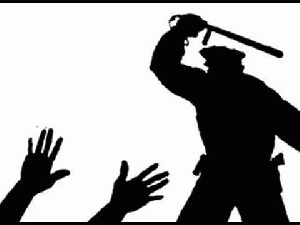Cross-posted from Empire Burlesque
I once saw the mighty Steel Pulse in concert. It was more than 20 years ago in, of all places, Knoxville. They were opening for Bob Dylan. They stepped onto the stage and proclaimed: "We are Steel Pulse, from Birmingham" -- and they didn't mean Alabama. They proceeded to fill the cavernous basketball arena with the most thunderous reggae I've ever heard -- exploding with boisterous joy, seething with a fierce thirst for justice. A night to remember.
In 2008, they covered one of Dylan's songs, a little-known single he released in 1971: "George Jackson." Jackson had been imprisoned at the age of 18 for a $70 robbery, sentenced to the maddening term of "one year to life." After a decade of self-education and principled defiance that led him to national prominence, he was killed by San Quentin prison guards during a disturbance in August 1971. Dylan recorded and rush-released the song a little over three months later. (Dylan's version is here.)
Following the police berzerkery in Ferguson, Missouri, America is going through one of its periodic -- but always brief and ineffectual -- moments of vague awareness about the virulent, brutal racism it carries in its body politic like an inoperable cancer. For a couple of weeks there, a few people in prominent positions mused in public about maybe taking a look at this race thing, just in case there might be a few little glitches in our glorious system. But that's about far as it went. And of course, most of our Prom-Peeps rushed to assure us, and themselves, that there are no racial problems in America -- except, of course, for the ones caused by the shiftless, grasping, ungrateful darkies themselves. (They've got a president, for Christ's sake! What more do these people want?)
In any event, our Prom-Peeps have now moved on to pants-wetting panic attacks about the Nazi Commie Russkies and the desert demons of Isis (aka "our former allies in the Syrian civil war"). But among those who live the American reality -- those who must live with the agonizing symptoms of the cancer -- the disease of racism continues its ravages. And as Berger shows, figures like George Jackson continue to exert a powerful symbolic relevance -- and a practical inspiration -- in the "lower depths" of the aptly-named prison-industrial complex, and beyond.
Below are a few excerpts from Berger's article. The whole thing is worth reading, and there are many links to further information.
"A young black man gunned down by law enforcement. His body is then left outside for four hours. The shocking gore of the situation sparks countless protests around the country calling for an end to racism. Meanwhile, popular attention to the incident prompts investigations into the young man killed, leading some critics to suggest that his working-class background and alleged criminal activities somehow make his death justifiable.
"It is not the last month in Ferguson, Missouri. It is not Michael Brown, Eric Garner, Ezell Ford, Roshad McIntosh or any of the other unarmed black men killed by police in recent weeks -- though it could be. It is San Quentin, California, in the year 1971. His name was George Jackson. Though more than four decades have gone by since he was killed, his life and death signal the ways in which this country's macabre routine of police violence against young black men and women has become institutionalized throughout the criminal justice system.
"...When George Jackson went to prison in 1960, there were 200,000 people in prisons around the country. When he published 'Soledad Brother' in 1970, the rate of imprisonment was the lowest it had been in 20 years, with 96 out of every 100,000 Americans in prison. When he was killed in San Quentin in 1971, there were 300,000 people incarcerated, a rate of about 200 per 100,000 people.
"Three decades later, when Gov. Arnold Schwarzenegger refused to stay the execution of Stanley Tookie Williams because the Crips co-founder had dedicated one of his anti-violence books to George Jackson and other well-known black activists (proving, Schwarzenegger said in a statement at the time, that Williams had not been rehabilitated), one in 100 American adults is in prison -- approximately 2.3 million people. As of 2011 one in 34 adults, more than 7 million people, is under some form of correctional supervision: prison, parole or probation. Five percent of the world's population, the United States imprisons 25 percent of the world's prisoners.
"Such staggering and lopsided rates of incarceration devastate whole communities, as the families of Michael Brown, Trayvon Martin, Renisha McBride and so many others can attest: Not only does mass incarceration break up families but it promotes punitive and preemptive policing of black life.
"... Jackson and other dissident prisoners were the canaries in the coal mine of our prison nation: Their experience being aggressively policed, excessively sentenced and brutally treated in prison has become the norm. The elements that made his case so noteworthy in 1971 -- the long sentence for a petty crime, the indefinite use of solitary confinement -- are now almost too mundane to be newsworthy.
"As long as the United States continues to police, imprison and kill so many young black men and women, George Jackson will remain a figure whose story needs to be told."






